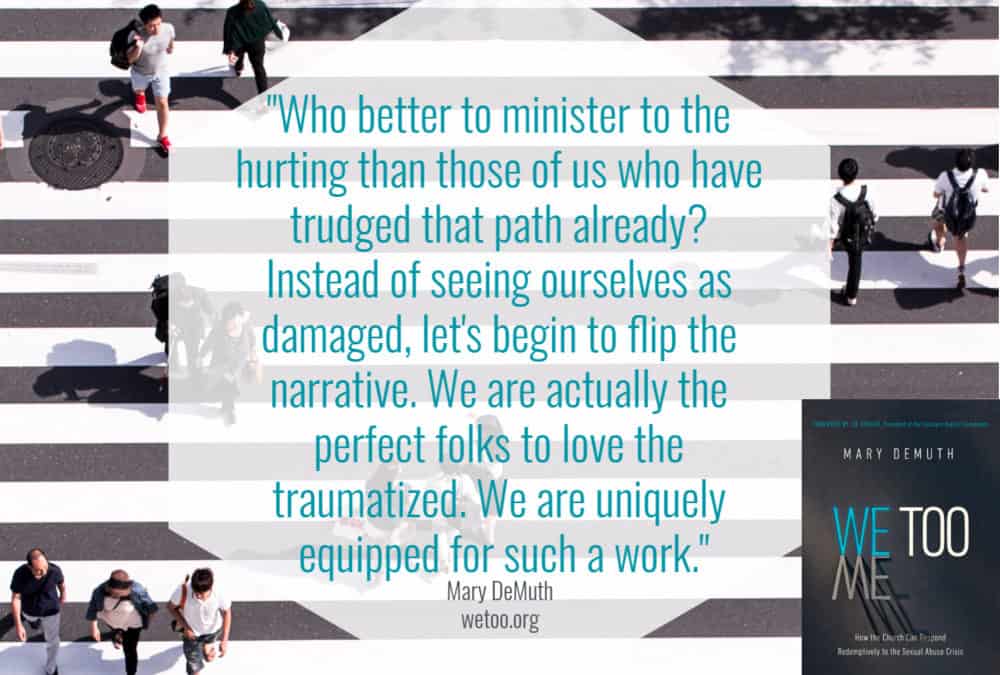In the April issue of Christianity Today, there was a little article tucked in on page 66 that rocked my heart. It’s titled, “Becoming Human Again: After Surviving the Rwandan genocide, Denise Uwimana devoted her life to promoting healing and reconciliation.” Bethany Hoang interviewed her.
Denise lost her husband in the genocide, and she has founded Iriba Shalom International, working on reconciliation between Hutus and Tutsis.
I found some haunting parallels in her story and those of sexual abuse victims.
Evil Still Happens
She was a Christian when all the genocide happened. “Being a believer did not spare me from tribulation,” she writes, “but my faith in Jesus remained firm.” She asked God about those verses about His protection. Because in her life, she was not spared from evil triumphing over her family. She even mentioned the role of the church. She writes, “I was disappointed at how church leaders were involved directly or indirectly in the killing.”
These are common issues and questions for sexual abuse survivors. We wonder why God didn’t spare us. We question His goodness. We struggle to reconcile all those promises in Scripture about protection with what actually happened. And we wonder why in the world the church has often been complicit in abuse or dismissive.
It was excruciatingly painful, but there is Purpose
When Denise returned to Rwanda after having relocated to Europe, she met with many survivors–women who had endured unspeakable atrocities. After hearing another horrible story, she wept all night long, and asked God how she could help. The Lord responded, “Just love them! Show them I am God. I still love them, and they will be my witnesses. Please don’t let them die in grief.”
This is why many sexual abuse survivors advocate for others. They know their own pain, the feelings of unworthiness, being ignored and marginalized, and their bouts with self harm, suicidal ideation, along with anxiety and depression. That desperation and loneliness fuels them to not let another suffer the way they had.
Denise encourages, “I was convinced that each of us had survived for a purpose: to encourage others who had suffered the same horrors and bring forgiveness, healing, and reconciliation to our society.”
If you are reading this, and you have endured trauma, hear me: there is purpose to your pain. I know that purpose cannot erase what happened to you. It cannot “make up” for what you have endured. But you have a unique opportunity to see Jesus change your tragedy into advocacy for those whose voices are crying out. They are longing to know they are not alone. They need mentors and guides to let them know that they will make it. As you pursue healing, you’ll begin to see the need for more people who will shepherd the broken.
Forgiveness is Hard
I have had an enormous amount of joy in advocating and bearing the burdens of sexual abuse survivors. It has fueled me with a holy fire to help others. Somehow it makes all that trauma MEAN something. It is a privilege to walk alongside you. But that doesn’t mean the forgiveness journey is easy. Even as I have healed, even as I have advocated, even as I fall backward in grief, I still struggle to forgive what happened to me–both toward the boys who stole my innocence and those who bystanded.
Denise wrote, “Forgiveness doesn’t mean that I forget what happened.” She is right. There is no such thing as forgive and forget. Forgiveness is powerful BECAUSE we remember. That is what makes it a gift. Forgiveness for us cost a Man his life; we must not tread lightly there. Nor must we prescribe someone else’s forgiveness journey. We must allow the Holy Spirit to shepherd that process in another. It is a long journey, with fits and stops.
Trauma is real
What I took away from this interview was simply the pervasiveness of trauma, no matter what its form. As we move forward in discipleship and evangelism, we must remember that many of the people we love and pray for have this as a backdrop to their lives. Who better to minister to the hurting than those of us who have trudged that path already? Instead of seeing ourselves as damaged, let’s begin to flip the narrative. We are actually the perfect folks to love the traumatized. We are uniquely equipped for such a work.
I wouldn’t wish trauma on anyone. I certainly wouldn’t ask for it again in my life. But I am grateful for the depth of healing and growth I have experienced not merely for my sake, but for the sake of those whose days are tainted by trauma. Who will shepherd them? Who will love them? Who will hold them as they cry?
It will be us.
…
We Too releases in less than a week! You can preorder it here.




Thank you Mary, for all your work! I too am a survivor of childhood sexual abuse, with a story similar to yours. At 50 I finally received professional counseling for the years of hurt I had stuffed. At 62 I began recovery groups to help others to heal. I use a curriculum by Julie Woodley called, “In the Wildflowers.”
It’s always a joy to see others move beyond the ravishes of their pain into a life of freedom.
God truly makes beauty from ashes!I
Are you familiar with an organization called G.R.A.C.E.? They are advocates for victims of faith based institutions, as well as educators and help churches set up proper guidelines and safety standards.
God bless you!
I am familiar with GRACE. They do amazing work!
I have chosen not forgive my offender or the people who supported him by covering up his crimes, allowing him to do what he did to me to other young girls since me. Jesus’s model of forgiveness always required repentance. 2 Chron 7:14, Luke 17, The Woman Caught in Adultery Go and sin no more.
Jesus does not and will not call us to a higher responsibility of forgiveness than He Himself taught. Otherwise we become God’s in our own eyes. Jesus’ forgiveness included forgetting. If we can’t forget, then we haven’t really forgiven, but have just allowed ourselves not be angry about what happened to us. That is not absolution. In the case of sexual abuse, forgiveness becomes part of the sin if it perpetuates the crime. Many abuse victims were abused by ministers, priests, Youth Pastors and church leaders. Their image of God have been so distorted, they do not want to hear about how they need forgive. I would never tell that to an abuse victim. We can’t prescribe another person’s faith walk or recovery process
I agree. We must allow the Spirit to lead people on that journey.